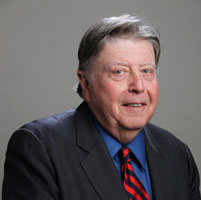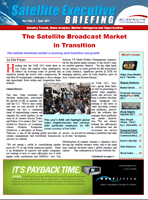Back and Forth with David Hershberg, CEO, Globecomm Systems
by Lou Zacharilla
Winston Churchill said that if there were ever a nuclear war between two enemies, the next war would be fought “with sticks and stones.”
If we consider the role of communications and satellites in the era of the “Cold War,” and apply it to evolving defense strategies and the role of the commercial sector, one thing has is proved: satellite is critical. There may be another 9/11, Pearl Harbor or Operation Barbarosa, the Nazi’s surprise attack on Russia in 1941. However, it is unlikely to happen without the satellite industry sniffing it out and perhaps helping to avert it.
 One person in particular came to mind as I thought about this. David Hershberg, CEO of Globecomm Systems.
One person in particular came to mind as I thought about this. David Hershberg, CEO of Globecomm Systems.
Hershberg had a unique task, long ago, which makes him a good voice for the satellite industry on the subject of avoiding the trap of nostalgia.
Lou Zacharilla (LZ): On May 1, we observed the anniversary of the death of Osama bin Laden and the day when the new World Trade Center exceeded the height of the Empire State Building. As someone who serves the defense industry and provides tactical communications around the world, what was your reaction?
David Hershberg (Dave): It was obviously a day that, as an American and a New Yorker, I acknowledged with vindication. Our international colleagues noted that the new Trade Center symbolizes the resilience of the American people, and peaceful people everywhere.
LZ: I thought about you as this anniversary approached. We are very good in our industry at using technology to thwart or to respond to new threats.
Dave: Or to produce them! We have to always be careful what we unleash.
LZ: True. There is a new book about the famous speech that Winston Churchill gave after World War II, when he declared that an “Iron Curtain” had fallen over Eastern and parts of Central Europe. It symbolized a new era of tension. It also gave rise to Sputnik, space exploration and defense systems, and eventually the growing role of the commercial side of the industry, which General Pawlikowski spoke about in March at the SSPI Stellar Awards program.
Dave: Yes. I remember this period and thought about as she spoke. I was a freshly-minted engineer in 1962, who loved radio systems. By default I became the satellite expert. There was no such thing, really.
LZ: The opportunity was new.
Dave: For a lot of us it was an opportunity that has not stopped. But in 1962, the Cold War became VERY hot and opportunities were not top of mind when the USA and USSR nearly launched an atomic war.
LZ:What few people may know is that you, a freshly minted young engineer who knew a bit about satellites, was instrumental in helping to keep the peace after the two sides backed-off.
Dave: I’m not so sure I’d go that far. You are referring to the Hot Line project.
LZ: After the near disaster, the two nations decided in Geneva to install a “Hot Line” between Washington and Moscow to offset future misunderstanding. What was your role?
Dave: I worked to provide a more robust communications link to the Kremlin. The link replaced a very slow teletype link, eventually with two redundant satellite paths.
LZ: People accepted the advantages of satellite?
Dave: Well, they accepted the advantages of better communications technologies to save their skin. This one was driven by the prospect of having looked into the abyss. Before the Hot Line, it took the two sides 12 hours to receive and translate a 3,000 word message. This was enough time for serious miscalculations.
LZ: Satellite evolved after this.
Dave: It evolved quickly. Courier 1B, built by Philco, had launched in 1960. It was the world’s first active repeater satellite. Telstar was the first active, direct relay communications satellite. It was part of a multi-national agreement between AT&T, Bell Telephone Laboratories, NASA and the postal ministries of Britain and France to develop satellite communications. But it was all new territory and the commercial possibilities were not unlocked until years later.
LZ: Your role was to make sure the Kremlin and the White House could connect quickly?
Dave: Yes. It was really that simple. The history is interesting. The Hot Line was used after 1963 in many tense situations around the world.
LZ: In the end, the Hot Line worked and you had a career.
Dave: Every iteration of it has worked, from the technical side. The world’s balance, so to speak, may have been secured by a system composed of 120 telephone channels and a poor analog video channel! But we made this stuff work, including the video channel. We built 85-foot Standard A terminals. Now we do the same thing at Globecomm with a 2.4 meter terminal.
I worked on ground stations for all of the new systems. It is amazing how far we have come, especially when I look around Globecomm and especially at the SSPI Gala and see the new players and technologies.
LZ: What can the industry do to have a sustained impact on global peace?
Dave: I talked about this when I was inducted into the (SSPI) Hall of Fame. The ability to provide information access behind the Iron Curtain was instrumental in bringing about changes there. Telling America’s story, and the story of how free people around the globe live, share innovations openly and allow access to information has had a profound effect on our economy and our business growth. Let’s allow satellites to keep telling the story.
We can also play a role in solving the cyber terror threat, which the Defense Secretary of the U.S. said recently will be where the next “Pearl Harbor” comes.
Let’s make sure we remind people that, as we used to say in our advertising, “A little satellite goes a long way.”
LZ: In the case of the Hot Line, it helped people sort through the toughest challenge I can imagine.
Dave: There will always be challenges.
-----------------------------------------------------------------------
 Lou Zacharilla is the Director of Development of the Society of Satellite Professionals International (SSPI). He can be reached at: LZacharilla@sspi.org
Lou Zacharilla is the Director of Development of the Society of Satellite Professionals International (SSPI). He can be reached at: LZacharilla@sspi.org





